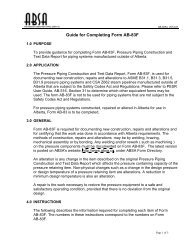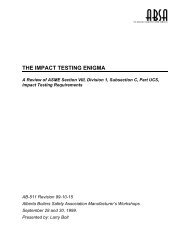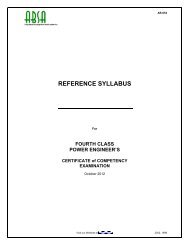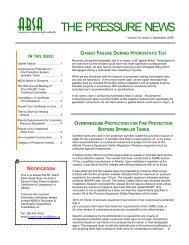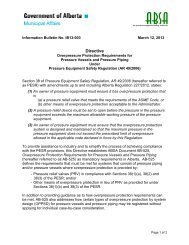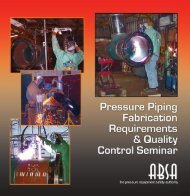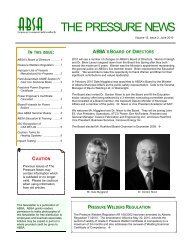The Baker Panel Report - ABSA
The Baker Panel Report - ABSA
The Baker Panel Report - ABSA
Create successful ePaper yourself
Turn your PDF publications into a flip-book with our unique Google optimized e-Paper software.
<strong>The</strong> interviews of Toledo hourly workers and management revealed perceptions of a poor safety culture that was plagued with morale issues,worker conflicts, and refinery operations that were neglected and underfunded. Responses to the process safety culture survey largelysubstantiated these perceptions.<strong>The</strong> Toledo refinery has a history of tension between management and the unionized BP employees, and between the unionized BP employeesand contractors. Management and the unionized BP employees have had a rather adversarial relationship over the years, and distrust betweenthem continues. A 2004 report by a third-party consultant noted that most of the people interviewed for the report agreed that “the level ofawareness and approach to safety is fragmented across the plant” for a number of reasons, including “distinct cultures of BP and the unionthat have not been well-integrated.” <strong>The</strong> report summarized that[m]ost say that the level of trust between the union and management is not good while others say it is almostnonexistent. This relationship is described as adversarial and said to curtail the possibility of issues being openlydiscussed, whether they pertain to safety or not, for fear of retribution.Many of the interviews of Toledo hourly workers and management confirmed the ongoing union-management tension at that site. Many hourly workersand managers interviewed characterized the union-management relationship as strained; some described it as toxic. Almost everyone interviewedagreed that this tension permeated the refinery and contributed to the lack of trust between refinery management and the workforce. <strong>The</strong> <strong>Panel</strong>concurs with a third-party consultant’s conclusion that if Toledo is to make sustained progress on its safety culture, “the poor relationship betweentheunion and management must be addressed.”Substantial tension also exists in Toledo between the unionized workforce and contractors. <strong>The</strong> hostility between the unionized BP employeesand the maintenance contractors apparently can be traced to the refinery’s decision in the 1990s to reduce the size of its in-house maintenancedepartment and move towards contractors as the primary maintenance workforce. According to the interviewees, many hourly employeesbelieved that the contractors did not have the necessary skills, did not understand the equipment, and did not take ownership in the refinery thesame way that employees do. At the same time, contractors interviewed stated that BP’s in-house maintenance workers refused to performdifficult jobs or work hard, and many BP managers interviewed shared this view of in-house maintenance workers.Toledo has had four refinery plant managers in the last six years, and it has experienced substantial turnover of superintendents and engineersas well. According to many interviewees, this turnover has harmed morale, raised questions as to BP’s commitment to the refinery, andnegatively impacted the employees’ willingness to buy into and accept new initiatives—including safety initiatives. <strong>The</strong> workforce is awarethat BP contemplated selling the Toledo refinery at different times between 2000 through 2004, and many remain unconvinced that the refineryfits into BP’s long-term plans. Moreover, many of the interviewees perceive that each new leadership team has had a different focus that isusually short-term oriented (cost-cutting and reorganization two plant managers ago, personal safety one plant manager ago, and now,equipment reliability with the current plant manager), making it difficult to establish with the workforce a shared vision about process safetyas a core value. Many interviewees also reported that the frequent turnover of refinery plant managers had contributed to an alienation betweenupper refinery management and the hourly workers.<strong>The</strong> interviews of the Toledo workforce revealed numerous issues reflecting a poor safety culture at that refinery: Most hourly workers interviewed indicated they believed that refinery management placed a higher priority on production than safety. Many hourly workers and managers interviewed indicated they believed that Toledo was underfunded and received inadequatecorporate attention and support because of its small size. Many hourly workers interviewed indicated they did not believe that incidents, near misses, and safety concerns could be freelyraised without fear of reprisal. <strong>The</strong> vast majority of employees interviewed indicated they believed that the refinery was generally understaffed, and that this hadcaused people to assume positions before they were qualified.Corporate Safety Culture C 114







